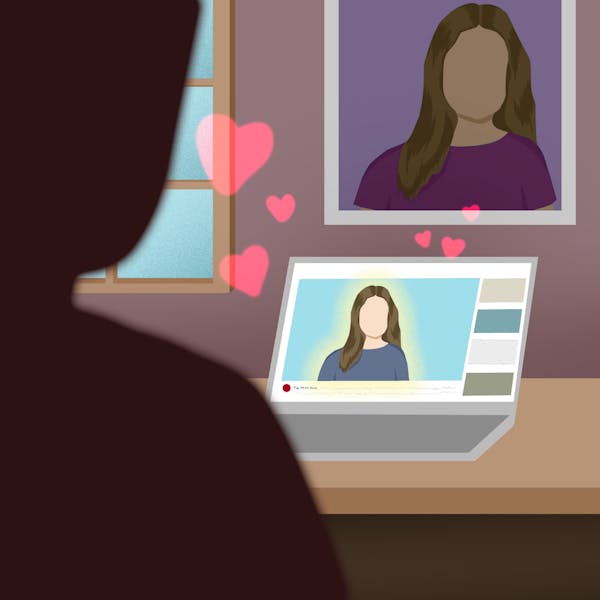The 2010s saw the rise of fandom culture, from the Marvel Cinematic Universe to the global spread of K-pop. Fandom has taken the internet by storm by drawing attention to your favorite celebrities on social media through fan art, fan theories, and fan fiction. It's not uncommon for fans to be passionate about entertainment, but some fanatics take it too far.
A parasocial relationship is a one-sided relationship in which an individual feels a strong sense of closeness, connection, or closeness to someone they do not know. Celebrities and media figures are the most likely recipients of this relationship.
It's not really understood why parasocial relationships begin, but many scientists believe that they are caused by the brain's developmental need to be social. When most people spend time online and in front of screens, the faces they see on a regular basis become familiar, creating positive feelings between the two.
Some believe that loneliness causes these relationships. Research shows that lonely people often seek connection online. Conversely, highly social people are more likely to have quasi-social relationships. psychology today.
In an article from Forbes Health, socioemotional needs, escapism, media exposure, and perceived friendships have been cited as some of the main factors that create parasocial relationships. said Angela Amias, a licensed social worker and clinical director of the Institute for Trauma-Informed Relationships. forbes Because quasi-social relationships have no real emotional risks, they seem safer than forming real relationships. It prevents people from reaping the health benefits that come from a true relationship.
While there are positive aspects to parasocial relationships, celebrities are speaking out about the negative aspects of these relationships.
Rapper Eminem released the song “Stan” in 2000, detailing his spiral into being stalked by a fan. “Stan” talks about mental health, fan obsession, and the responsibility of public figures to their fans. Eminem talked about how Stan found solace in the situation the rapper portrayed in the song.
The final verse of the song depicts Eminem replying to Stan's letter, not knowing that the fan had passed away. He pleads with Stan to get help, as he fears that Stan might hurt himself or others. Ultimately, the song became an influential medium promoting the dangers of fan psychology.
A research paper by fan studies scholar Rybka Grossman combated the ideology that parasocial relationships are inherently negative.
“The one-sided nature of parasocial relationships and the resulting uneven power relationship between fan and persona may seem psychologically unhealthy,” Groschman wrote. “However, this view may change if we consider celebrities as service providers.”
Grozman's article compares a barista who memorizes a customer's “overcomplicated order” to BTS member Jungkook, who immediately shakes a fan's hand. While she claimed that she was just hoping that Jungkook would “buy BTS' next album,” she added, “While both of these interactions are one-sided, they don't show delusion. “Why is the first interaction frowned upon, but the second disliked?” picture? ”
This article highlights a unique perspective on fan-celebrity relationships. Fans will see a body of work from their favorite celebrities, but are under no obligation beyond that.
Recently, the term “fan service” has become popular. Often used in anime, manga, and manga when a story arc or decision is made to reassure fans. However, K-POP's “idol style'' also includes fan service by these idols.
Idols, or Korean K-pop celebrities, are told to influence the desires of their fans in order to gain popularity, and most of an idol's success depends on their fandom.The BTS leader in his 2019 livestream on the now-defunct V Live site R.M. He called his fans “lovers.” This word was spread as a joke among BTS fans, and this light-hearted banter formed a parasocial relationship between RM and fans.
In 2022, Nigerian author Otega Uwagba shared a horrifying experience he had with a fan. guardian. She talked about how following a fan back on her social media led to an outburst of love for her and an amount of unwanted touching that was “suffocating”.
“I started receiving emails and notifications and messages spread across Instagram,” Uwagba said. “Then it became uncomfortably more frequent. She wanted something from me: to work for me, to see me, to know how my weekend went, to have her Telling me how her weekend went, telling me about the job she hated, me helping her with her projects. She was leaving.”
While she went through trials with her fans, there was another experience that resulted in death between celebrities and their fans. John Lennon, Christina Grimmie, and Selena Quintanilla Perez are all celebrities who lost their lives to compulsive parasocial relationships.
Parasocial relationships are an unfortunate consequence of the entertainment industry and cause personal boundaries to be crossed. These one-sided connections could also put the lives of celebrities at risk. Instead of forming parasocial bonds, fans can develop healthy boundaries with other fans and individuals outside of their fan circle.
simply_nyny
ng972522@ohio.edu

